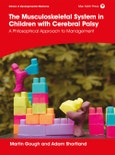This book advocates a new approach to the clinical management of the musculoskeletal system in children with cerebral palsy based on the concept of intervention to a complex adaptive system with the aim of improving the lived experience of the child with cerebral palsy.
- Provides a critical review of the current understanding and management of musculoskeletal deformity in children with CP, in the context of the available evidence base and models of clinical practice.
- Transfers current understanding of muscle and bone physiology and impairment, from the realms of research into mainstream clinical thinking
- Discusses an alternative clinical model of assessment and intervention, focusing on impairment of muscle growth and function
- Considers the musculoskeletal system in a child with cerebral palsy as a linked system of interactive processes and subsystems, extending from individual molecules to the child and their environment.
The concepts discussed regarding clinical knowledge, evidence, causation, and complex adaptive systems are relevant to the clinician, child, and family, and the possibility of new models and new therapeutic approaches offer exciting future opportunities to improve the child's interaction with, and experience of, the world of which they are a part.
Table of Contents
Foreword
Preface
Acknowledgments
1 What we think and why we think it: our clinical model of cerebral palsy
2 A made-up story about data, knowledge and clinical judgement
3 The musculoskeletal system: not just a structure but a process
4 Musculoskeletal system development: typical and altered trajectories
5 Evidence-based medicine and cerebral palsy
6 What does all this mean?
Index








